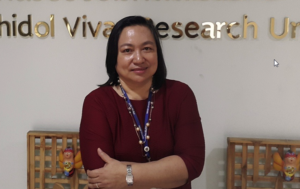
There are many remarkable Southeast Asian women who work in important areas in research institutions, governments, universities and pharmaceutical companies. This project aims to celebrate these amazing women and to inspire young women to take up careers in research and research-related fields.
Dato’ Dr. Goh Pik Pin
Dato’ Dr. Goh Pik Pin is currently the Director of Institute for Clinical Research (ICR), National Institutes of Health, Ministry of Health (MOH), Malaysia. ICR is the clinical research arm of the MOH. She played a major role in establishing ICR’s network of Clinical Research Centres (CRCs) located at major MOH hospitals throughout the country. These CRCs have been established to facilitate research undertaken at the government hospitals by assisting with obtaining ethics committee approvals, trial monitoring, data management and providing training to young researchers.
She considers her work in establishing hospital CRCs and helping doctors and other healthcare providers conducting clinical research as her highest professional achievement. She says, “I am so happy when I see these bright-eyed young doctors delve into research and publish papers. Some of these papers have even been translated into clinical practice and health policies.”
When asked about the challenges of being a woman in research, Dr. Goh said, “I think gender should not be a barrier. In Malaysia, there are more women than men in medical schools nowadays, and many women have chosen research as a career.” As with her advice to young women, Dr. Goh said, “Tell people what you want to achieve; don’t be afraid to say it, and you’d be surprised people will come forward to help you.”
Dr. Goh has also contributed significantly to the field of ophthalmology in Malaysia. She was the first qualified Public Health Ophthalmologist in Malaysia and was key to the establishment of the public health ophthalmology subspecialty in Malaysia. She has also won many awards in ophthalmology such as the “Gold Medal for the Distinguished Service Award” by the Malaysian Society of Ophthalmology and “Outstanding Service in Prevention of Blindness” by the Asia Pacific Academy of Ophthalmology.
Dr Jetsumon Sattabongkot Prachumsri
Dr. Jetsumon is the founder and Director of the Mahidol Vivax Research Unit, Mahidol University, Thailand. She has been working on malaria research since 1985 when joined AFRIMS, a US Army research facility in Bangkok.
Dr. Jet takes pride in being the first in many things. Her colleagues give her the nickname “game-changer”. For example, her team was the first to create a method to test transmission-blocking vaccines for vivax malaria using human parasites, and her lab was one of the first few labs in the world that evaluate transmission-blocking candidate vaccines. This work has contributed significantly to the progress of vivax malaria research. When asked what her career goal is, Dr. Jet said, “I hope to see one effective vaccine for vivax malaria developed”. There is a vaccine for falciparum malaria but no vaccine for vivax malaria yet.
Dr. Jet has 3 grown-up children. When asked about challenges working as a woman balancing a career and family life, she said, “As a woman in science in Asia, I am very lucky. In Asia, because of our culture, we have good support from our extended family.” What is it like working as a woman in her field of research? “I work with men most of my career. Sometimes, my bosses or colleagues, who are men, feel threatened by me, because I always state my opinion. I studied at a girls’ school where I was taught to voice my opinion. She jokes, “In Asia, I have been told I am aggressive, in the US, they said I am very direct.”
What is her advice to young women who want to go into science as a career? “For both men and women, you have to have passion. Don’t give up when you meet obstacles.”

Dr. Souksamone Thongmexay
Dr. Souksamone Thongmexay, who works at the University of Health Sciences (UHS) Vientiane, Laos is a professional woman juggling a research career and family life. She says that she is extremely lucky because her husband helps out a lot with the children and household chores.
After finishing her degree in medicine, Dr. Souksamone obtained her master’s degree from Thailand in the field of health education and health promotion. Dr. Souksamone is currently a lecturer and a researcher on adolescent sexual and reproductive health in UHS. She said, “Research gives me a chance to work with the community, provides me with new things to try out and helps me improve myself. I started out doing fieldwork and now I also supervise young researchers. ”
When asked what are the challenges of women working as researchers in Laos, she said “I think this work can be quite difficult for women. You have to travel for fieldwork, and it is especially difficult to work in the remote areas because in Laos is a mountainous country. In addition, some families don’t support young women who want to have a career because they are expected to stay at home to look after their children.”
She says that unfamiliarity with research as a field itself is often an obstacle: “When I introduce myself as a researcher, some people do not know what I do. In Laos, there are very few women in this role. I can count on my two hands how many women are researchers in Laos.
Where does Dr. Souksamone see herself in the future? She said, “I’d like to improve the access to the sexual and reproductive health services of the adolescents in Laos. I also want to work with policymakers to make this happen.”
Comments